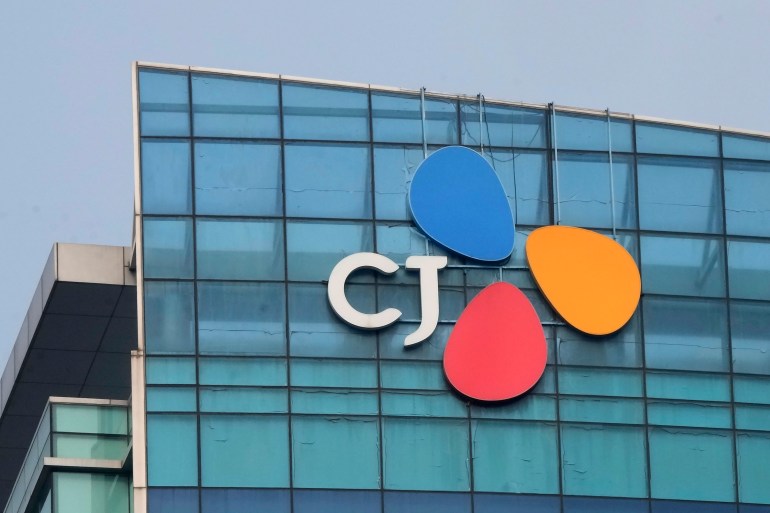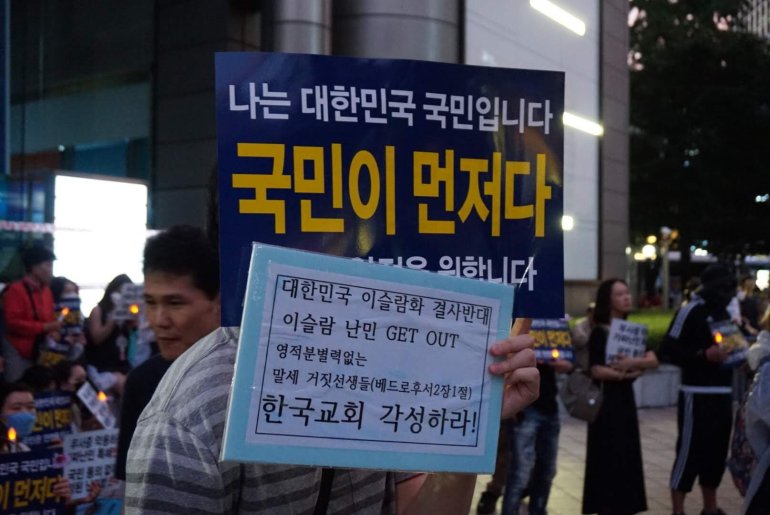Seoul, South Korea – On the Malaysia Worldwide Halal Showcase final September, an unlikely sight caught the eye of many attendees.
Nestled among the many cubicles from Muslim-majority nations comparable to Indonesia and Kuwait, a kiosk representing pork-loving, hard-drinking South Korea beckoned guests to take a look at halal merchandise starting from seaweed laver to sanitary pads.
“The halal food market is a blue ocean with great potential for growth,” Lee Yong Jik, the pinnacle of the meals export division at South Korea’s Ministry of Agriculture, Meals and Rural Affairs, advised Al Jazeera.
After taking the worlds of movie, TV and pop music by storm, South Korea is setting its sights on the worldwide halal trade, which caters to the dietary guidelines and way of life necessities of some 1.8 billion Muslims world wide.
Halal just isn’t simply related to historically homogenous South Korea, the place the Muslim group is estimated to quantity fewer than 200,000 folks, or lower than 0.4 % of the inhabitants.
However surging demand for Korean delicacies and snacks in Southeast Asia, the place Korean popular culture has a faithful and rising fanbase, has turned Korean exporters onto a probably profitable alternative.
Muslims’ spending on halal meals alone reached $1.27 trillion in 2021 and is projected to succeed in $1.67 trillion by 2025, based on analysis agency DinarStandard.
South Korea’s authorities has been eager to encourage companies to capitalise on the development, offering help starting from meals ingredient evaluation to subsidies for certification charges and promotional occasions to attach consumers and suppliers.
In 2015, then-President Park Geun-hye signed an settlement with the United Arab Emirates to advertise companies in new markets, together with halal meals.
In Daegu, South Korea’s fourth-largest metropolis, native authorities have spearheaded a “Halal Food Activation Project” aimed toward growing the variety of halal-certified corporations within the metropolis tenfold and tripling exports to $200m by 2028.
Daegu Mayor Hong Joon-pyo lately described the halal market as a chance that “cannot be ignored”.

Lotte Meals, CJ CheilJedang, Daesang and Nongshim are among the many Korean meals giants to have rolled out halal-certified merchandise from kimchi to rice truffles.
Final yr, South Korea started exporting halal Korean native beef, referred to as hanwoo, for the primary time after receiving the go-ahead from Islamic affairs officers in Malaysia.
Samyang Meals, one in all South Korea’s main meals producers, exports halal merchandise to 78 nations, together with its wildly common “Buldak Ramen” on the spot noodles.
Samyang’s gross sales of halal merchandise reached $200m in 2022, accounting for about 45 % of whole exports. Gross sales in 2023 have been anticipated to succeed in about $270m.
Samyang has “consistently recognised the importance of the Muslim market” and has been actively working to advertise “K-food” globally, an organization spokesperson advised Al Jazeera.
Aside from the meals trade, gamers within the so-called “K-beauty” sector have additionally cashed in on the development.
Cosmetics producer Cosmax, which has its headquarters in Seoul, has been producing halal merchandise at its amenities in Indonesia since 2016.
Regardless of the rising market, gaining halal certification can appear daunting for a lot of companies, particularly smaller corporations.
“The first step is to determine if your product is halal and if it is, then assess whether you actually need halal certification,” Saifullah Jo, chairman of the Korea Halal Affiliation (KOHAS), advised Al Jazeera.
A South Korean nationwide who transformed to Islam, Jo based an Islamic consultancy agency for Korean corporations and has translated a ebook about halal into Korean.
“Just because a company requests certification, doesn’t mean we will grant it. Some people come to us seeking certification for things that may technically be certifiable but it’s not always practical,” stated Jo, whose organisation is one in all South Korea’s 4 halal certification our bodies.
“We need to consider the audience and the genuine necessity for certification.”

Whereas alcohol, blood, pork and animals not correctly slaughtered within the identify of God, and meat from animals that died earlier than slaughter, are thought of haram, or prohibited, even seemingly innocuous objects like rice and mineral water will be candidates for halal certification.
“The complexities arise in the production processes. For example, when rice is separated from husks in the milling process, the machinery involved may utilise lubrication and some oils may contain animal-derived ingredients,” Jo stated.
“This causes cross-contamination and presents a challenge for ensuring the final product is halal-compliant.”
To make issues extra difficult, Indonesia, residence to the world’s largest Muslim inhabitants, final yr introduced that meals corporations would from October be required to acquire halal certification throughout the nation.
In November, the South Korean and Indonesian governments reached an settlement to exempt agricultural and meals merchandise from certification within the Southeast Asian nation as long as they’ve acquired the halal label from two of South Korea’s certifiers.
Whereas South Korea has made no secret of its ambitions to forge enterprise connections with the Muslim world, social attitudes in direction of Muslim folks and Islamic tradition are sometimes not so pleasant.
“Muslims in South Korea are viewed at best with apathy and, at worst, with fear,” Farrah Sheikh, an assistant professor at Keimyung College who specialises in Islam in South Korea, advised Al Jazeera.
Sheikh stated some Koreans view halal merchandise as a conduit for Islam to “invade” Korean society.
In Daegu, the place officers are aggressively pursuing the Muslim market, plans to assemble a small mosque have encountered fierce opposition from residents and conservative Christian teams.
In August final yr, rapporteurs of the United Nations Human Rights Council expressed “serious concern” to the South Korean authorities over its alleged failure to deal with the marketing campaign in opposition to the mosque, which included the show of pig heads outdoors the development website and banners describing Islam as “an evil religion that kills people”.
After the federal government started selling the halal trade in 2015, a number of Christian teams started warning in regards to the potential “Islamification” of South Korea, an alleged inflow of Muslims and considerations about safety dangers related to halal meals, main the federal government to problem an explanatory doc to dispel misinformation and rumours.
In 2016, the proposed building of an industrial zone for the manufacturing of halal-certified merchandise within the western metropolis of Iksan fell by way of on account of opposition from Christian teams.
That very same yr, a model of potato chip made in Malaysia attracted controversy over halal certification on its packaging, which was later eliminated with out rationalization.
In 2018, South Korea witnessed a wave of protests in opposition to the arrival of a number of hundred Muslim asylum seekers from Yemen. Throughout the identical yr, plans for a prayer room on the Winter Olympic Video games have been cancelled, following vehement protests by anti-Muslim campaigners.

For Muslims really dwelling in South Korea, halal merchandise will be tough to search out.
Whereas there are eating places providing halal meals, they’re primarily clustered in Seoul and different massive cities with substantial Muslim communities.
With little in the way in which of halal merchandise accessible on grocery store cabinets, some Muslim residents have resorted to re-importing halal-certified “made in Korea” on the spot noodles for his or her consumption.
Requested in regards to the lack of halal merchandise in South Korea, Samyang Meals stated there was inadequate home demand to help a market at current.
“However, as the number of Muslim visitors and residents in Korea increases, interest in halal products is growing. Samyang Food is also reviewing the marketability of selling halal products in the Korean market to make it more convenient for domestic Muslim consumers to purchase halal products,” a spokesperson stated.
Sheikh, the Keimyung College professor, stated Korean corporations couldn’t be blamed for desirous to money in on a profitable market.
“However, when we see Korean attitudes towards Muslim refugees, or as we have seen in Daegu, we have a clear discrepancy and a big social problem,” he stated, including that South Korea should enhance its angle in direction of Muslims if it desires to higher goal markets abroad.
Saifullah Jo of KOHAS stated he sees a vibrant future for Korea’s halal trade regardless of the challenges.
“Looking at it from the Korean industry’s standpoint, we are aware of the potential, and we should move swiftly. One of Korea’s key strengths is its ability to adapt rapidly,” he stated, including {that a} rising halal market might promote tolerance and understanding.
“Despite some negative minds, we are thinking positively about going into this new market, and Koreans are learning as well. It helps us open up culturally.”

